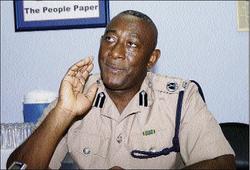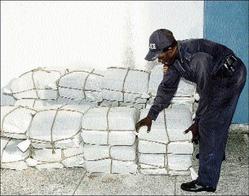
Assistant Commissioner of Police Denver Frater, the commanding officer in charge of Area One. - Photo by Noel Thompson
When Assistant Commissioner of Police Denver Frater started his law-enforcement career in Montego Bay as a young policeman in 1979, the resort town was dubbed the 'friendly city'.
Now, 29 years later, with the city's image tainted by crime and violence, Frater was recently given the task to repair the damage as the new commanding officer for Area One - St James, Trelawny, Westmoreland and Hanover.
The Gleaner recently caught up with Frater and sought his assessment of the current situation and his plans to rein in the lawlessness, which is causing much fear and anxiety, and is seen as a threat to both tourism and the information technology sector.
From a purely policing perspective, how much different is St James today from your earlier years as a young policeman in this parish?
The landscape is basically the same, but the conduct has somewhat changed for the worse. They are a lot more brutal and more guns and ammunition are in the hands of reckless youths. Also, the community has expanded, with more unstructured communities being developed, and this in itself poses a significant challenge to law enforcement. Nonetheless, we recognise that we have a tremendous task to work with the communities, bearing in mind that a significant number of our good people reside in these areas and have to traverse on a daily basis to the commercial section of the town and they too deserve to get quality policing service.
St James has done serious damage to the reputations of several top-flight commanding officers, who have come here within recent times and, despite their best effort, have failed to rein in lawlessness. How do you plan to make a difference?
I am not sure I would want to concur with your assessment of damage being done to the reputations of previous commanding officers. It is indeed a tough community to police and, without the kind of resources to deal with the issues that they confront, it would appear that there might be some level of ineffectiveness on their part, but one must recognise that St James, unlike the Corporate Area, is more or less a stand alone division with the support of the mobile reserve, the patrol division and other formations that exist in the Corporate Area not readily available. Therefore, dealing with the challenge here can be sometimes overwhelming. I think that being here, and having served here before, this situation presents me with an enormous opportunity in understanding the environment and terrain, and to a certain extent the culture.
Are you in any way daunted by the fact that you are now facing what you could consider second generation criminals who, in addition to having more resources, would have seen the quote and quote mistakes made by their predecessors and figure they are better equipped and smarter?
Experience over the years has allowed me to interact with some communities with similar problems to St James, although St James is somewhat unique with things such as the lotto scam, which is a new crime to law enforcement. In addition, if you look at some of the youngsters involved, some are still attending school ... some are very bright guys, who have chosen to take up this dangerous career. If you look at what they have been able to do with this illicit money in terms of access to arms and ammunition, acquiring transportation, forming gangs, killing and maiming without sound reasons; one sees a level of sophistication. These youngsters pose (a new) kind of threat to law enforcement and the society in general. Even some of the parents, who use to be involved in criminal activities, are now willing to support any initiative to change the kind of mindset that now exists among some of these youngsters. I am hopeful that, with constant professional policing service, we will be able to make some positive headway.
The lotto scam had its first arrest in 2002 and six years later it still appears to be alive and well in some communities. How disappointed are you that the scam still remains a major policing concern?
I am very disappointed in the sense that we are not getting the support of the persons affected, who are mostly external to our shore. The kind of cooperation that you would have anticipated is just not forthcoming. However, with constant dialogue with law enforcement in the United States, Europe and other countries, there is enough cooperation that we can soon start to make the kind of breakthrough we would like to make. In fact, with the support of our law-enforcement partners, especially from the United States, we have been able to impact in a positive way a number of 'scammers' through the Proceeds of Crime Act, which has very strong teeth and is very active in putting pressure on a number of these persons. We are hell-bent on continuing in this particular direction as the scam is the root cause of the problem in terms of arms and ammunition, murders and shootings, and the robberies and kidnappings taking place across this region.
One of your predecessors, senior superintendent Newton Amos, once described Montego Bay as a 'drug den', where high-profile criminals operate with impunity. Do you believe that this is still true?
We have made significant inroads as it relates to the smuggling of cocaine from South America into Jamaica and from Jamaica to North America. By virtue of the cooperation between Jamaica and other countries, we have seen the arrest and conviction of several major players from this region. One must recognise that Jamaica is a country in open waters and we cannot ignore how vulnerable we are in terms of accessibility by vessels moving along our coastline. Not withstanding that, our marine capability has been increased, our border-control mechanisms have been increased and our communication systems are much-improved. There is currently a lull in that kind of activity, but we are not dropping our guard. The Haiti/Jamaica guns for drugs trade remains a major problem but, thanks to increased cooperation between the governments of Haiti and Jamaica, a considerable amount of work is being done to address this problem. As I mentioned before, we are putting a lot of pressure on the lotto scam and recent information has revealed that some of the players are now moving into other Caribbean territories to collect money from the scam. However, efforts are now being made to address that particular situation.
With 159 murders in St James since the start of the year, residents continue to live in fear. What assurance can you give that this scourge will ever be contained since business and other aspects of life cannot thrive amid such hostility?
You will agree that policing is such an important business that it cannot be left to the police alone. It must be a partnership approach. For the police to be effective in such a way that the community can have the kind of confidence caused by the absence of fear, everybody needs to get on board so that we can work as team to impact this problem. I recognise that the majority of our workforce still live in communities that are currently experiencing some challenges in terms of crime and violence and, yes, it is the duty of the police to ensure that these people get in and out of their communities safely, without the unnecessary interference of criminal elements. We have identified a number of active hot spots and we are currently on the ground in these communities. I am conscious of the fact that the fear of crime and violence is alive and well but, notwithstanding that, I would still want to urge our citizens to tell what they know about crime. We have trustworthy police personnel, justices of the peace, ministers of religion and other upstanding citizens that they can communicate information through. I am also conscious that some residents have relatives who are involved in criminal activities, but they too have a responsibility to communicate that kind of information to the right person so that action can be taken. I am also conscious of the fact that the issue of trust and confidence regarding the police is a concern, but I am sure that there are persons who every member of these communities have confidence in. I have reason to believe that our citizens are fed up and tired of this crime scourge, and, I am sure, if we work together, we can succeed in our mission to address this problem.

Sergeant Elvis Malcolm of the Montego Bay Freeport Police adjusts one of 20 bales of ganja discovered in an Irwindale home in St James. - FILE

